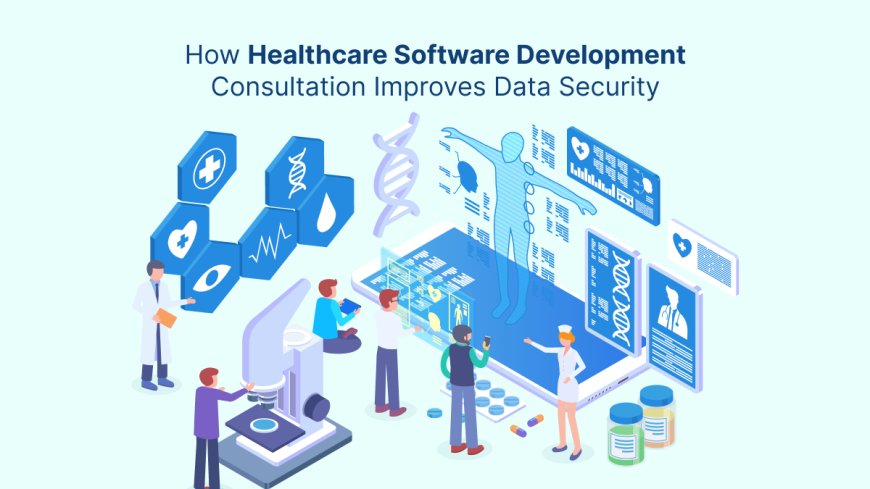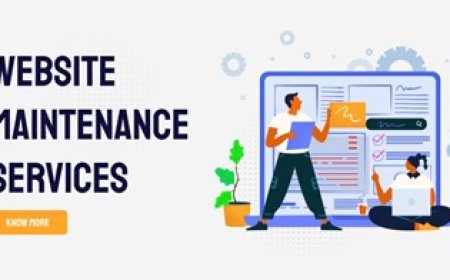How Healthcare Software Development Consultation Improves Data Security?
Learn how healthcare software development consultation improves data security with expert guidance, compliance strategies, and robust protection measures.

In today's digital-first world, the healthcare industry handles a massive amount of sensitive patient information every day. From electronic health records (EHRs) to insurance claims and lab reports, this data flows constantly through systems and networks. While digital transformation brings convenience and speed, it also opens doors to cyber threats, privacy breaches, and compliance issues. Thats where healthcare software development consultation steps in.
Consultation in software development isn't just about building applications. Its about offering expert guidance, assessing risks, recommending the right security practices, and creating a strong plan to protect healthcare data from both internal and external threats. Healthcare software development consultants act as strategic advisors, helping hospitals, clinics, and medical platforms build solutions that are secure, efficient, and compliant with laws like HIPAA and GDPR.
In this blog, well explore how healthcare software development consultation improves data security, the key areas it covers, the role of consultants, and the benefits it offers to healthcare organizations aiming to secure their systems and patient data.
Why Data Security Is So Important in Healthcare
Protecting Sensitive Patient Information
Healthcare data is not just a collection of numbers or filesit includes deeply personal information like medical history, diagnosis, treatments, prescriptions, and insurance details. If this data gets into the wrong hands, it can be used for identity theft, fraud, or other malicious purposes. Securing this data is a top priority for every healthcare provider.
Rising Cyber Threats
Hospitals and medical systems are now top targets for hackers. Cybercriminals often target outdated systems or networks with poor security to steal patient records or hold systems hostage using ransomware. Without proper guidance, many healthcare providers are vulnerable to these attacks.
Regulatory Compliance
Countries across the world have introduced strict data protection regulations for the healthcare sector. In the U.S., theres HIPAA, while the European Union enforces GDPR. These rules require organizations to handle and store patient data in specific, secure ways. Failure to comply can result in heavy penalties, lawsuits, or damage to the organizations reputation.
What Is Healthcare Software Development Consultation?
Expert Evaluation and Planning
Healthcare software development consultation involves working with experts who understand both healthcare operations and advanced software development. These consultants analyze the organizations current systems, identify risks or weaknesses, and recommend secure, scalable solutions tailored to their specific needs.
Consultants dont just suggest fixesthey help build a strategy for long-term security by aligning technology with the healthcare providers goals and compliance requirements.
Bridge Between IT and Healthcare Teams
One of the biggest issues in healthcare software is the gap between technical developers and healthcare professionals. Consultants act as the middle ground, translating medical needs into technical features and ensuring that both compliance and data protection are part of the development process from day one.
How Healthcare Software Development Consultants Improve Data Security
Conducting Risk Assessments
The first step in securing healthcare software is identifying where the threats exist. Consultants perform a thorough risk analysis to look at vulnerabilities in existing software, networks, and workflows. They check for outdated systems, weak access controls, missing encryption, and other risks that could lead to a data breach.
Based on their findings, they offer recommendations to fix these weak spots before they become actual threats.
Designing Secure Architecture
A secure application starts with its architecture. Consultants help design the foundation of healthcare software in a way that supports data protection. This includes secure APIs, database encryption, firewalls, and strong user authentication. The goal is to build a system that can resist cyberattacks and prevent unauthorized access from the beginning.
Implementing Access Control and Authentication
Not everyone in a hospital or clinic needs access to all data. Consultants suggest role-based access controls, meaning only authorized personnel can view or edit specific information. For example, a receptionist may only have access to scheduling data, while a doctor can access patient records.
They also recommend strong authentication methods such as multi-factor authentication (MFA), where users verify their identity using more than just a password.
Encryption and Data Protection
Encryption is one of the most effective ways to protect data. Consultants ensure that both stored data (at rest) and data being shared across networks (in transit) are encrypted. This makes the data unreadable to anyone who doesnt have the correct decryption keyeven if it gets intercepted or leaked.
Consultants also recommend backup strategies and secure cloud storage, so even in case of a system failure, the data remains protected and can be quickly restored.
Monitoring and Threat Detection
Security isnt a one-time taskit needs continuous monitoring. Consultants set up systems for real-time threat detection, alerting the organization about unusual activities such as unauthorized logins or data transfers. They help implement tools like intrusion detection systems (IDS) and security information and event management (SIEM) platforms to stay ahead of potential breaches.
They also help define clear protocols so that when a threat is detected, staff know exactly what steps to take.
Ensuring Legal and Regulatory Compliance
Consultants are well-versed in healthcare regulations such as HIPAA, HITECH, GDPR, and local data protection laws. They guide the development team to build software that automatically follows these rules. For example, they ensure audit logs are in place, access is restricted properly, and data retention policies are clearly defined.
This approach helps organizations avoid legal trouble and builds trust with patients and partners.
Benefits of Consulting in Healthcare Software Security
Cost-Effective Security Planning
Consultants help organizations save money in the long run by preventing data breaches and avoiding regulatory fines. Instead of paying to fix problems after they happen, healthcare providers can invest in secure solutions from the beginning.
Future-Proof Solutions
Technology and threats evolve constantly. Consultants plan for future growth by designing software that can be updated easily and withstand future security challenges.
Increased Trust and Patient Confidence
When patients know their data is safe, theyre more likely to engage with digital platforms such as patient portals, telehealth apps, or mobile health trackers. This trust is valuable for long-term relationships and service satisfaction.
Smooth Software Development
Consultants guide the development process with security as a core focus. This leads to fewer delays, better project outcomes, and software thats not only functional but secure by design.
Read more: How a Healthcare Software Development Company Improves User Experience?
Real-Life Examples of Data Security Consultation
Upgrading Legacy Systems
Many hospitals still use old software that doesnt meet modern security standards. Consultants help redesign these systems or migrate them to newer platforms, ensuring that no sensitive data is lost during the transition.
Building Secure Telemedicine Platforms
During the rise of remote care, many healthcare providers launched telemedicine apps. Consultants helped design these apps with encrypted video calls, secure logins, and safe data sharing features to ensure that remote care didnt compromise data privacy.
Integrating Systems Safely
When merging different software systemslike billing, lab reports, and patient recordsconsultants ensure data is transferred securely and that there are no gaps where data could leak or be misused.
Future Trends in Healthcare Software Security
AI-Powered Security Tools
Artificial intelligence is being used to detect unusual behavior in real-time and predict possible security threats before they happen. Consultants are helping integrate these tools into healthcare systems.
Blockchain for Patient Records
Some healthcare systems are starting to explore blockchain as a way to store health records securely. Blockchain creates an unchangeable history of data, making it nearly impossible to tamper with.
Biometric Access
Fingerprint scans, facial recognition, and retina scans are being introduced as more secure ways to access healthcare systems. Consultants help assess when and how to implement these technologies safely.
Patient-Controlled Data
New models are allowing patients to control who sees their data and for what purpose. Consultants help design these features while ensuring security and compliance.
Conclusion
In a time when data breaches and digital threats are rising rapidly, data security in healthcare cannot be taken lightly. Healthcare software development consultation brings the much-needed expertise to build systems that are secure, compliant, and prepared for future risks. From identifying vulnerabilities to designing secure systems and guiding legal compliance, consultants offer a 360-degree approach to data protection.
For healthcare providers looking to develop or upgrade their software, partnering with experienced consultants is a smart move. They ensure that every decision made during development puts security first, creating a trustworthy system for both patients and medical professionals. As the healthcare sector continues to grow digitally, having the right consultation can make all the difference. Working with a knowledgeable clone app development company that understands data security and compliance can help your organization stay ahead, safe, and efficient in todays fast-changing tech world.
FAQs
How does a healthcare software development consultant help with data security?
They assess risks, suggest secure architecture, guide regulatory compliance, and help implement data protection measures like encryption and access control.
Why is consultation important before building healthcare software?
Consultants provide expert advice on how to build software that meets both functional and legal requirements, reducing long-term risks and improving project success.
Can consultants help with older healthcare systems?
Yes, they can evaluate legacy systems and recommend upgrades or migration plans that improve security without disrupting operations.
How does role-based access improve security?
It ensures that only authorized users can view or edit specific data, reducing the risk of misuse or accidental leaks.
Do consultants stay involved after the software is launched?
Many consultants offer ongoing support, updates, and monitoring to ensure that the software remains secure as technology and regulations evolve.



























